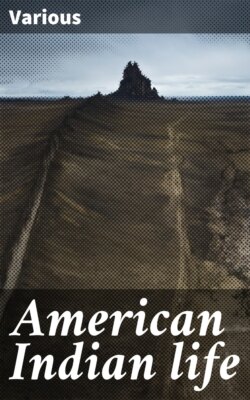Читать книгу American Indian life - Various - Страница 14
На сайте Литреса книга снята с продажи.
A Trial of Shamans
ОглавлениеTable of Contents
Big-dog was troubled; he knew he should not sleep that night. White-hip, blind old White-hip, had passed him with a taunt. He did not mind the old fellow’s gibes, yet. …
It all happened long ago. White-hip was stretched out in his lodge one night when a young kinsman named Shows-his-horse burst in upon him.
“They say you are a great medicine man, take pity on me, I am in distress.”
“Well, what ails you?”
“As I approached my tent this evening, a man came out, wrapped in his robe. He has stolen my wife; I want revenge.”
Then White-hip said, “You are my younger brother; I will help you. Who is it that has stolen your wife?”
Shows-his-horse replied, “It was Big-dog.”
Then White-hip shrank back and asked, “Are you sure it was Big-dog? The night is dark, you may have made a mistake.”
But the young man answered, “It was still light when I saw him—a short, stocky man with the wolf-tails at his heels plainly visible dragging along the ground.”
White-hip said, “My younger brother, it is wrong for a man to mind the loss of a woman. If your joking-relatives should hear of this, they will sing songs in mockery of you. This is dangerous business. The Thunder himself has adopted Big-dog as his child.”
Then Shows-his-horse flared up. “They told me you were a great medicine man, that is why I came to you in my grief. I see you are afraid; your medicine is worthless.”
Then for a long time White-hip spoke not a word. At length he said, “It will be very difficult, but my medicine is strong. Though the Thunder himself be his father, I will lay him low.”
It happened that a few days later Big-dog set out on a war party against the Sioux. Then White-hip prayed to the sacred stone that was his medicine. And Big-dog’s war party was met by a superior force of Sioux that killed one of his followers and scattered the rest. There was grief in the Crow camp and the people were wondering about Big-dog’s first failure. But Shows-his-horse brought his three best horses as a gift to White-hip, and slowly the news leaked out that a trial of strength was on between the two great shamans of the tribe.
Soon after this event White-hip, too, wanted to go on the war-path, and the men who had been thwarted by Big-dog’s failure were eager to join him. But the very night they set out, Big-dog prayed to the Thunder: “I do not want you to afflict my people; only he that leads them shall meet with disaster.” And it rained and stormed in the war party’s path, and a tree, felled by lightening, grazed the captain’s shoulder. Then the braves were alarmed and insisted on turning back.
Thus, when either of the shamans had set out against the enemy, the other was sure to thwart him, till neither ventured on a war party, and the whole camp were wondering who should conquer in the end. At last Big-dog could contain himself no longer. Once more he addressed the Thunder: “These scars are from the flesh I cut as an offering to you, these finger-joints were chopped to make you a present. You made me your child. That one is mocking me and you. He thinks his is the greater medicine; smite him with blindness.”
And before the cherries had ripened, White-hip had lost his sight. Then Big-dog triumphed and the Crows all said that he was the greatest shaman they had ever had and that his medicine was the most powerful of all; and White-hip was deserted by all but his next of kin, and became so poor that for a while a rope served him for a belt.
But the blind man still had faith in his medicine and one day he thus invoked it: “His father has made me blind and miserable. I do not care if you can make him miserable too. He has three sons. Kill them all and make him live till his skin cracks from old age and force him to beg his food from strangers.”
Then on the next war party Big-dog’s eldest son was slain by the Blackfoot; and people began to say that perhaps White-hip had not been conquered for good. And a year later his second eldest son died from sickness. Then the Crows all said it must be White-hip’s work. And before the leaves had turned yellow, the shaman’s last son was drowned in the Yellowstone. Then some said that, for all that, Big-dog had won, for he himself was well, while his enemy was blind. But others thought that White-hip, despite his blindness, had shown himself superior.
And as years passed, Big-dog grew infirm. He outlived his nearest kin and those more remote till no clansfolk remained. He would wander about from lodge to lodge, feasting on what strangers offered him in sheer compassion. He would hear mothers whispering to their children, “Big-dog was a great medicine man once and the whole tribe stood in awe of him, but White-hip had the greater medicine and laid him low.”
And just now White-hip had passed him with a taunt. He did not mind the blind fellow’s mockery, but one thought troubled and racked him and would not let him sleep at night: “Whose medicine was really the greater? Who had won?”
Robert H. Lowie
